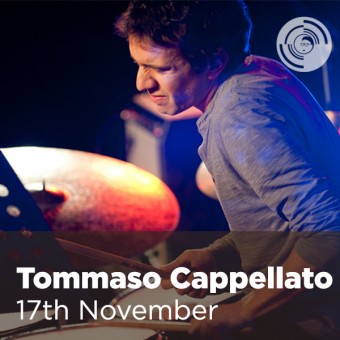Tommaso Cappellato
Drummer and composer Tommaso Cappellato is a really exciting figure in jazz today, with a number of projects and band line-ups to channel his creativity through, as well as a number of anecdotes from his time learning under one of jazz’s lesser known figures, but one equally as important in afro-jazz styles as a Norman Connors, Shamek Farrah or Phil Ranelin; ‘Black Renaissance’ composer Harry Whitaker. We discussed Whitaker’s work, his collaborations with Mark de Clive Lowe and his feelings on the Spiritual side of musical expression when we caught up with Tommaso ahead of his show with Astral Travel at Band on the Wall on 17th November.
Astral Travel is the ensemble with which you explore spiritual jazz styles. Aside from the genre’s usual connotations, what do you find so interesting about that music?
There are various aspects about this particular style that seem to resonate with what my vision of music is. The issue has always been to find a balance between self expression, mannerism (so typical of many jazz traditions) and channeling a message – either political, spiritual or cosmic – through the imagination of new sonic scenarios. It’s a form of jazz that can always be reinvented and has no preconceived boundaries, and therefore allows the artist to find freedom in the inspiration.
Was your time with Harry Whitaker when you first became aware of spiritual jazz music or were you already influenced by that music prior to your meeting? Did he introduce you to any standout favourites?
When I met Harry and started hanging out with him, I was somewhat aware of some of the important discography within the genre, but what he really turned me onto was the approach with which he would get involved into his musical projects, that is with the sincere intention of moving souls and create awareness. Needless to say he played me his “Black Renaissance” masterpiece and told me all the stories behind working with Roy Ayers’ Ubiquity, serving as Roberta Flack’s musical director and much more, all covered in this Wax Poetics article. Another beautiful work he did in the early 80’s is called “One Who Sees All Things” released on CD on Smalls Records in 2008. This is the work that mostly stuck with me as I never heard anything like that before (nor after); through his use of the voices, both female and male, his strange way of orchestrating common instruments and his compositional ideas, I really saw a lot of possibilities in arranging and started thinking more as an all round musician rather than just a drummer. Rarely you find such musicianship as the one Harry had.
Tommaso Cappellato Glowrogues
17 November / 19:30 / More Info / Buy Tickets
Tommaso Cappellato is a creative and eclectic drummer, composer, producer and band leader. He has extensively travelled the world, touring and collaborating with many influential artists. During his 20’s Cappellato spent a decade in New York crafting his technique and style. He received a BFA in Jazz Performance at The New School University, and took part in several acts playing many styles of music, from mainstream jazz to experimental techno. Among his latest projects are his 14-piece “Tommaso Cappellato Orchestra,” arranged and conducted by Michele Corcella, his tribute to Spiritual Jazz “Astral Travel,” a dedication to the memory of late pianist, composer and arranger Harry Whitaker, and his drums/synths solo “Aforemention”. Cappellato collaborated with musicians of the likes of Michael Blake, Fabrizio Bosso, Don Byron, George Cables, Mark De Clive-Lowe, Steve Grossman, Jon Hendricks, Richard Julian, Morphosis & Upperground Orchestra, Debbie Harry & The Jazz Passengers, Enrico Pieranunzi, Enrico Rava, Kurt Rosenwinkel, Bill Ware’s Vibes, Yah Supreme & Brohemian. In 2013 Tommaso was granted the JAJ Award by Shuya Okino (Kyoto Jazz Massive) acknowledging him as the year’s best new artist.
“Good drummers keep the rhythm but outstanding ones color it. Cappellato is an artisan”
Support comes from Glowrogues, a new band of rising stars from Manchester and Birmingham, playing funk and hip-hop flavoured pieces by Molyneux, using electronics to manipulate the horn section sound, creating an experimental edge. Uplifting and energetic.


